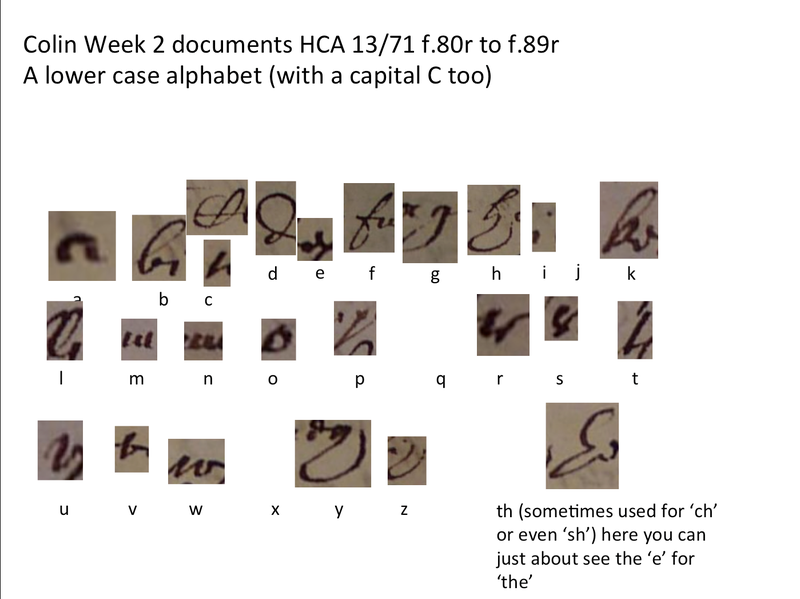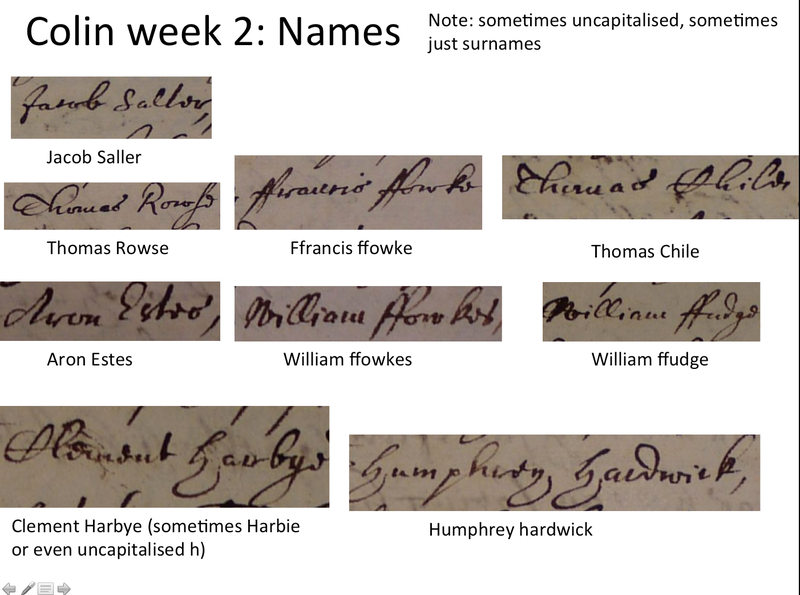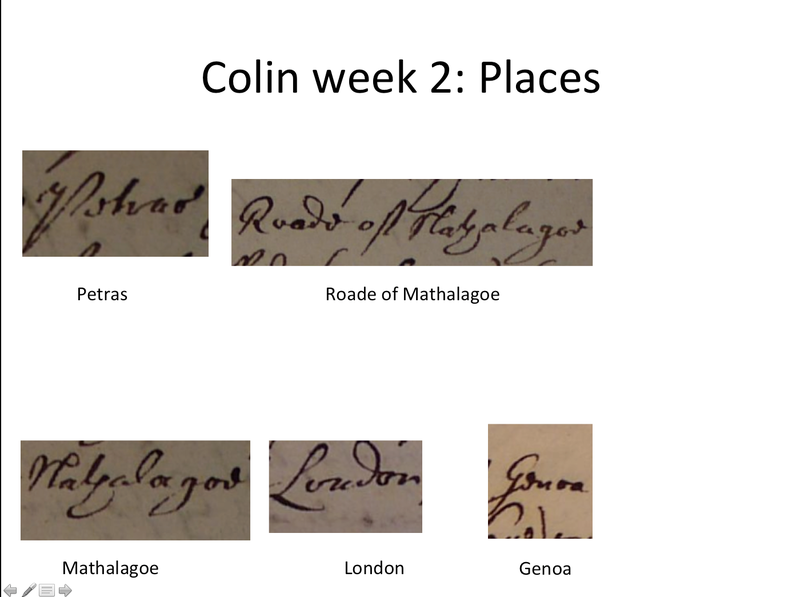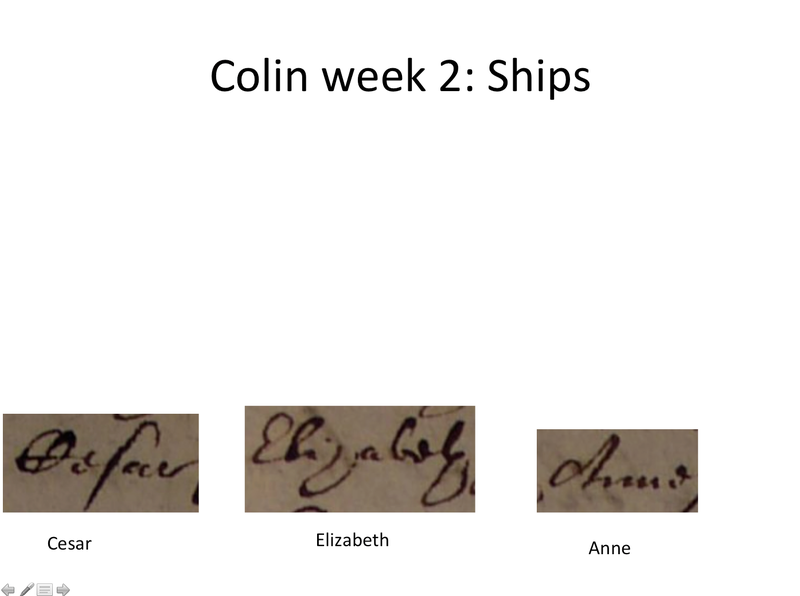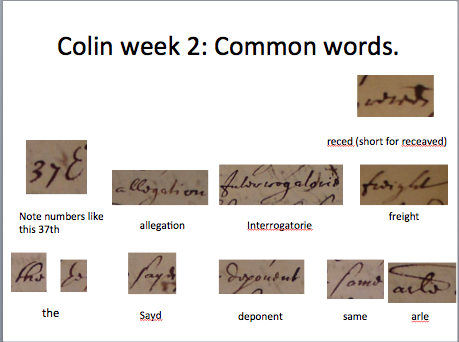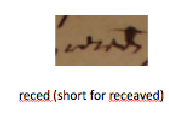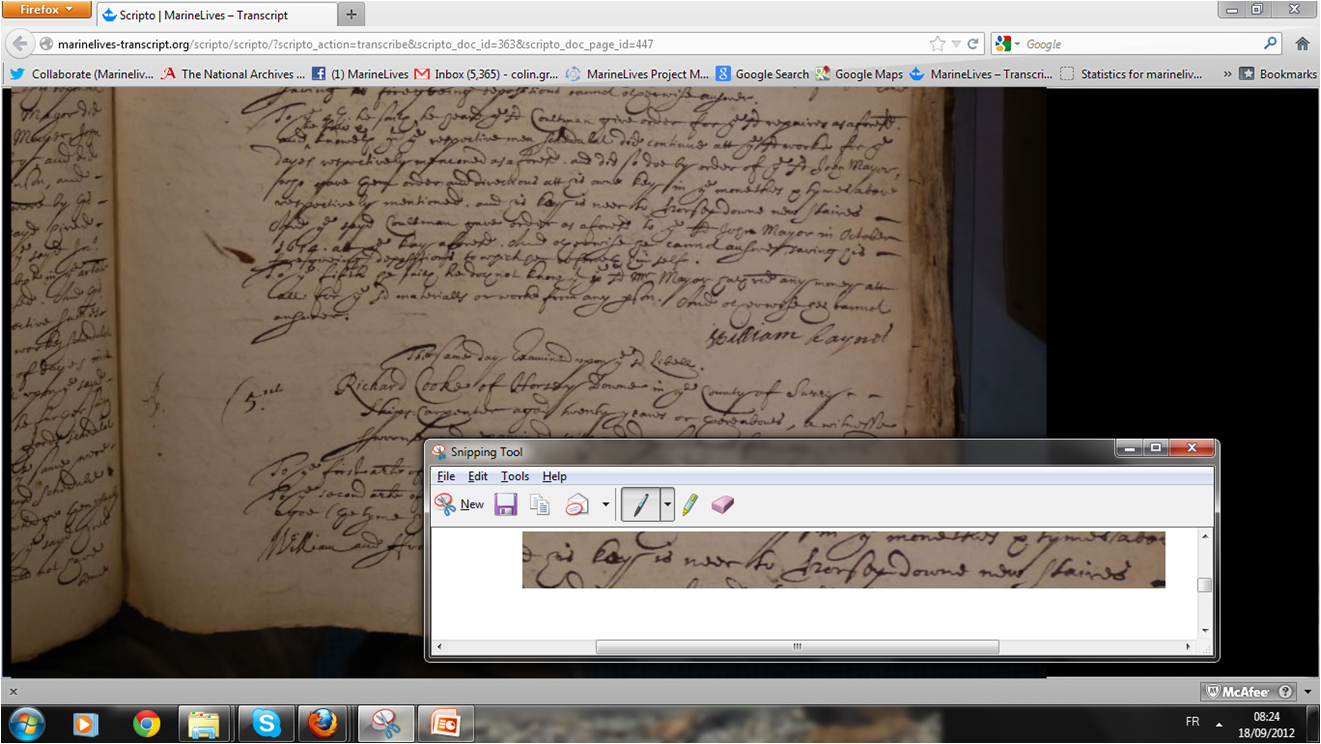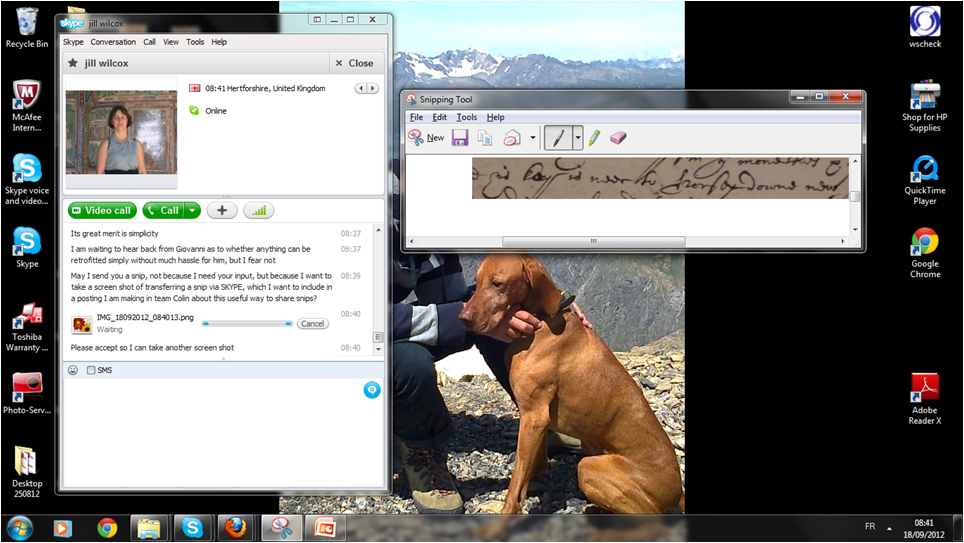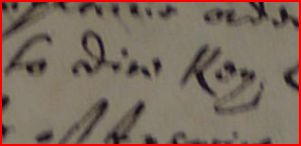Team Colin
Team Colin
Editorial history
23/08/12: CSG, created page
Contents
- 1 Suggested links
- 2 Tasks for the week
- 3 TIPS from Colin
- 4 QUERIES FROM IAN COWLEY
- 5 QUERIES FROM COLIN GREENSTREET
- 6 QUERIES FROM EMMA HARDY
- 7 QUERIES FROM ALEX JACKSON
- 8 QUERIES FROM DANIEL RICHARDS
- 9 QUERIES FROM LAURA SEYMOUR
- 10 QUERIES FROM TOMMY WALTERS
Suggested links
Page log
Team Jill
Team William
Team Giovanni/Patrizia
MarineLives-Transcript: Team Colin
Tasks for the week
Week commencing 20th August 2012
- 19/08/12: Uploaded four images (HCA 13/71 f.19r, f.19v, f.20r, f.21r)
- These are images for palaeography practise by all MarineLives team members
- 22/08/12: Uploaded twenty seven images (HCA 13/71 f.21v-f.34v)
- These are additional images for palaeography practise by all MarineLives team members
Week commencing 30th August 2012
Week commencing 3rd September 2012
Week commencing 10th September 2012
Notes and help for Colin week 2 HCA 13/71 f.80r to HCA 13/71 f.89r
Below you can find some slides with common names, places, ships, and words that come up in this set of documents. You can also find an alphabet made from clippings from that set of documents.
Alphabet
Names
Places
10/09/12: Mathalagoe in slide below is possibly "Nathalagoe" (Colin Greenstreet)
- Can an associate or a facilitator find it on a map and identify what the modern name is for this place?
Ships
Common Words
Week commencing September 17th (week two of transcription)
Interesting places
Horsey down
Horsey down appears in a law suit over the failure to pay the wages of the shipwrights and shipcarpenters for the repair of a ship called the Swan (formerly the Satisfaction) The boat was being repaired at the personal wharf of John Mayor: "his key is neer the horsey downe new staires", which was on the Thames. (HCA 13/71 f.138r P1130442)
But where was or is Horsey down?
- There is a modern Horsey down in Wiltshire, but the one in HCA 13/71 f.138r is clearly on the Thames. Looking at John Strype's Survey of the Cities of London and Westminster helps us focus our search. The online academic edition of Strype's book is easily searchable, and yields the following entry:
"The TEMPORAL GOVERNMENT. [Maiors and Sheriffs.]
A.D. 1683. } { Peter Daniel, Haberdasher.
35 Car' II. } Sheriffs, [ Click here to view Image of coat of arms, Sir William Pritchard ] { Sam. Dashwood, Vintner.
MAIOR, Sir William Pritchard, Mercht. Taylor,
Son of Francis Pritchard of Horsey-Down in Southwark, Surrey."[1]
- Knowing that Horsey down, or "Horsey-down", was in Southwark, helps a lot with the next search, which yields the following entry on an online numismatic site called 'British Farthings'
"Horslydown (or Horsey Down): So called from its having been used as a grazing place for horses"[2]
The farthings listed under this entry include:
"W267: Southwark, Horslydown (or Horsey Down) (Farthing): (1657)
O Three sailors
AT YE 3 MARRINERS IN
R R S S
HORSSE DOWNE 1657 R S S"
and
"W271: Southwark, Horslydown (or Horsey Down) (Farthing): (Date Unknown)
O [Blank]
THE GREEN MAN AT
R W T V
HORSEN DOWNE STARES W T V"
The second farthing, with its mention of "Horsen downe stares", together with the maritime theme of the first farthing, suggests that at least part of Horsey down was on the River Thames (as was suggested in the extract from HCA 13/71 f.138r, which started this search ("his key is neer the horsey downe new staires")
- Now to some secondary sources.
Edward Walford in volume 6 of Old and New London (London, 1878) provides a description of Tooley Street, in Bermondsey, Southwark. This is available at British History online.[3]
Reading this entry, it is soon apparent that prior to 1733, Horsey down, also known as Horselydown, was a district of the Southwark parish of St. Olaves. St. Olaves church being located on the north side of Tooley Street. Following the building of its own church in 1732, Horsey down became an independent parish, known as the parish of St. John.
Walford, reviewing early seventeenth century accounts of the derivation of the name, includes the observation:
"speaking of the derivation of the name of Horselydown, the author of "A New View of London" (1708), remarks: "This street, as I was told by a sober counsellor at law, who said he had it from an old record, was so called for that the water, formerly overflowing it, was so effectually drawn off that the place became a green field, where horses and other cattle used to pasture and lye down before the street was built." Near it, as we further learn from the same work, was Horselydown Fair Street, described as a considerable street, between Paris Street, Tooley Street, and Five Foot Lane, Southwark."
Modern map of Tooley Street
Interesting people
Interesting commodities
TIPS from Colin
TIP: Snipping images of difficult words and phrases and sending by SKYPE to your team facilitator or fellow team mate
TIP: Did you know that you can use Microsoft's nifty SNIPPING TOOL to snip out a word, or phrase, form the digital image of the manuscript page you are looking at and then send it via SKYPE to your team facilitator or to a fellow team mate to get their view on the problem?
Here is what you do.
(1) Open Snipping Tool (which comes as standard with MS-Windows)
(2) Highlight the word or phrase you want to share and copy it using the snip tool
(3) Open a chat box in SKYPE with the person or persons you want to share it with and simply paste it into the box with CTRL + V
(4) The snipped image is then sent to the person or persons you have invited to look at it. They click on SAVE IMAGE in the SKYPE box, look at the image, and type into the Chat box what they see.
This has saved me, Jill Wilcox and William Tullett hours as we have been improving our palaeographical skills over the last few weeks.
TIP: Common words which may prove difficult
- Contest; precontest
- Rendent
- y:t (transcribe this as "that")
- y:m (transcribe this as "them")
TIP: Legal language
- Note that you answer to an interrogatory, but depose to the articles of an allegation (allon)
- Note that deponents are often asked whether they have an interest in the cause and whether they are otherwise concerned with the matters, to which they usually reply that they favour only the truth
- "vizt" is an abbreviation for "videlicet", which means "namely" or "to wit"
- See Contractions and Suspensions in MarineLives Transcription & Editorial Policy: Draft Five for other abbreviations (both contractions and suspensions) and the correct way to expand them in your transcription work
QUERIES FROM IAN COWLEY
QUERIES FROM COLIN GREENSTREET
13/09/12
- Does anyone know what "dennage" means, and what the related to be "Dennys" for goods means.
- See:
19. And this Rendent did often urge the sayd Masters to be gone, and one of them
20. vizt William Shrotch sayd positively he would not till he had further order
21. from his Owners, which he pretended to expect from Dublin, and refused
22. to signe the bills of lading, pretending he was Master for the shipp, and Dennys
23. for the goods
(HCA 13/71 f.162r P1130491)
Earlier
- HCA 13/71 f.19v Completed by Colin – please would someone check
- HCA 13/71 f.21r Started by Colin - please would someone finish
- HCA 13/71 f.22v P1080930
- Line 3: "hee saith he ćannot depose"
Question: is the acute accent over the "c" or over the "a". This problem is a very frequent one on most manuscript pages
- Contrast with Line 7: "otherwise he cánnot depose." (HCA 13/71 f.24v P1080934)
- HCA 13/71 f.24r P1080933 Started by Colin - please would someone finish
- "Samuel Dun of Limehouse in the County of Midds Mariner late cheife
masters mate and Steevador on board the shipp Thomas Bonadventure
Capt Hughes Commander the voyage in question, aged 36 yeares..."
- HCA 13/71 f.24v P1080934 Started by Colin - please would someone finish
QUERIES FROM EMMA HARDY
QUERIES FROM ALEX JACKSON
- 13/71 f.82r P1130365 Started by Alex - Please refer to the first line: Have I got the name 'Currans' correct? Also, can anyone work out what the word immediately infront of it is? Is it Gulyle? Is this a first name?
- COLIN: "Currans" is correct (= modern "currants": word infront of it is "Gulphe", For examples of the usage of "Currans" and "Currants" see Commodities
13/71 f.82r P1130365 Started by Alex - Also, attached to the word deposed (apparently attached) on lines 1 and 5 are what appear to be a 'p' and an 'e', but this doesn't work. Might it be 'pre'deposed? If so, could somebody explain why?
- COLIN: The word is indeed "predeposed", and means that the witness has already deposed on the matter, and is referring back to it. Clerks often ommitted the "e" in "pre", writing "prdeposed". Our editiorial convention is to expand the contracted form, inserting the missing letter in italics, as in "predeposed". For legal commercial terms in HCA documents see Legal & Commercial Terms
- 13/09/12: Started by Alex - Please refer to lines 5 and 8 on HCA 13/71 f.70v and lines 16 and 35 on HCA 13/71 f.82r. Is the place name Potrao? It continues to look like that to me, but I don't find that name in the section 'Geographical and Place Terms' so I suspect I'm reading it wrong. There is a 'Poltrao' in that section, but I can't see an 'l'. Any suggestions?
- COLIN:
(1) I have looked at lines 5 and 8 of HCA 13/71 f.70v P1130342 and lines 16 and 35 of HCA 13/71 f.82r P1130365. In the case of lines 5 and 8 you are misreading: it is "PetraX" with the X either an "o", or possibly an "s"; in the case of lines 16 and 35 it is again "PetraX". In line 16 you can clearly see that it is an "e" if you look three words to the right to "Cesar" (a ship's name", where the "e" of "Cesar" is identical to the "e" of "PetraX"
(2) See "Poltrao (the Road of ?Poltrao" (HCA 13/73 Part Two))" in Geographical and Place Names: P. I have not rechecked my original transcription of "Poltrao", and I may myself have been wrong with this spelling. I suspect this is the same place as your reading of "Potaro", but there are also other spellings
(3) See also a SKYPE conversation I had today with Jill Wilcox, who had a similar question:
[15:20:08] jill wilcox: Hi colin there a place in the notes for colin week 2 which is transcribed as petras, do you know where this is?
[16:06:33] Colin Greenstreet: It is either Petrao or Petras, and I think it is in the area in the Greek islands called Morea, see: Early nineteenth century description of Venice to Morea and onwards trade (http://bron.wikispot.org/Zante#head-57612aa08d517d203248b1ab90c7ddd144c70a4e)
[16:07:12] Colin Greenstreet: Infact, looking at that URL, I see a place called "Petrasso" . "Currants, it has been observed, are a considerable article of export from the Morea; Petrasso is one of the best ports to ship them from; the fruit is rather larger and more free from and or gravel, than that of either Zante or Corfu. They are shipped in various sized casks, from twenty hundred weight to fifty pounds. The quantity shipped must weight above five hundred weight net, otherwise, they are liable to seizure. The casks are always included in the weight of the fruit, and paid for as such; the Morea currants have the preference in most countries, except England, where the Zante currants are more merchantable."3"
[16:10:47] jill wilcox: karen thought it might be patras which is a place in Greece, and on the coast
[16:11:43] Colin Greenstreet: That is possible. If it is mentioned in the context of currants it is likely to be Petrasso as above, but that could also be the place called Patras Karen has identified"
- 13/09/12: Started by Alex - Please refer to lines 22 and 24 on HCA 13/71 f.70v '. There appear to be brackets in the text. How do I insert this punctuation?
- COLIN: I presume you mean the curved brackets "(...)" as in the snippet below. I have very occasionally seen square brackets "[..]". I would render curved or square brackets as curved or square brackets. You can type curved brackets straight into the text input box. With square brackets, go to MS-Word and go to Insert Symbol. Find square brackets and insert them into a blank MS-Word document, then copy and paste them into the MarineLives-Transcript text input box. You can zse this Insert Symbol approach via MS-Word for a huge range of characters
QUERIES FROM DANIEL RICHARDS
QUERIES FROM LAURA SEYMOUR
Quay/Key: Images
LAURA: 19/09/20: Hello - am rather stuck on the name of the quay mentioned throughout HCA 13/73 f.199r P1130555 It's quite clear to read, it's just I haven't come across the letter form of the first letter before so have variously guessed at 'Link Key', 'Ynk Key', and 'dice Key' all of which I'm sure are wrong. I've uploaded some examples as 'Key.jpg', 'Key2.jpg', 'Key3.jpg'
and tried to attach them below too but don't know if that worked
COLIN: 20/09/12: Laura, the first letter is a "d" and the word is "dice Key". The north and south banks of the River Thames ("River of Thames") were crowded with keys (quays) and wharfs in the mid-C17th. I am not exactly sure what the difference was between a key and a wharf.
Great Dice Key was the second key to the East of Billingsgate Dock, and ran from the River Thames northwards to Thames Street. See: Strype: Dice Key (Great), Tower Ward in Old Bailey Online
It would be excellent if over the next ten or twelve weeks we could synthesise the HCA 13/71 references to London keys and wharfs, produce a Google Map of the references, and use extracts from the HCA cases we transcribe to bring the life on the keys alive. At a minimum there is the potential for a MarineLives-TheShippingNews public blog item, but there is also a potential academic article lurking in there, since this topic is not well researched. There was a whole sub-world of cranemen, wharfingers, warehousemen, boxmen, porters and others around the keys, providing a linear, west to east focus for the city.
Searches in http://bron.wikispot.org (my personal research wiki which all project associates have access to), using some of the above words (and of course spelling variants) would start to show you and others what sort of primary source material from the mid-C17th which is available, especially in Chancery Court documents, inventories, wills, and (to a very small extent) Sir George Oxenden's letters.
See the following links of possible interest to http://bron.wikispot.org
20th March 1662/63, Letter from Peter Cooze to Sir GO, Ratcliff
...ivered at the sewall certaine wharfes at Woolwich Dartford or Dep ... ered att any of the aforemenconned Wharfes of Woolwich Dartford or Dep ... and upon some (or one of the sayd Wharfes) And by the said S:r Willia ... yder and lodged in the said sewall wharfes being about the Latter end ... eight fetched from the said sewall Wharfes all such ffaggotts as the s ... brought out of the said Woods and wharfes ??these yo:r Orator// //af ... ad fetched away// //from the said wharfes within the said yeare of ou ... nd receiveing from the said sewall wharfes such or such like quantitie ... of the said S.r William Ryder not wharfing the said ffaggotts in time ... om// //the said woods to the said wharfes soe long after the said con ... references to their conflicts with ...
...hter was near the lower Chalk wharf, on the Kentish side of the r ... river of Thames neere lower Chalke wharfe about halfe a mile from Grav ...
C5/485/75 Inventory of M:r Thomas Gaskins yard ff. 1-7
... timber being stored upon the wharf. The technical vocabulary us ... :6 peece// //Oaken baulks upon the wharfe// //Beame of a ould ship: Oa ... , 1926))]] //Oaken Baukes upon the wharfe// //Beam of a ship old oake/ ...
...se in the waterhouse of Brokenwharfe Eldest daughter Susanna Lett ... ece of ground where one was A Cole wharfe where is Decreed by the Judg ... Seaventy and one Which houses and wharfe I give aunto my eldest sonne ... ree Leases in Durham Yard the Cole wharfe In possession of James Gatto ... te way goeing downe to M:r Huttons wharfe also the house on the left h ... hand leading downe to the said Colewharfe As by the Deceree of the Jud ... nne John Letten I hould Three Cranewharfe the Remainder of a lease of ... dred sixty and eight which was the wharfe where one formerly lived Wil ... taine time to pay that same or the wharfe became absolute which was no ... absolute which was not done ditto wharfe is at present lett at a hund ... e Lease of the waterhouse of Broken ...
QUERIES FROM TOMMY WALTERS
- ↑ Strype, Survey of London (1720), [online] (hriOnline, Sheffield). Available from:- http://www.hrionline.ac.uk/strype/TransformServlet?page=book5_150&display=normal Accessed 9.9.2005
- ↑ http://www.britishfarthings.com/Tokens/17th-Century/Southwark/Horslydown.html, accessed 18/09/12
- ↑ http://www.british-history.ac.uk/report.aspx?compid=45269, accessed 18/09/12
